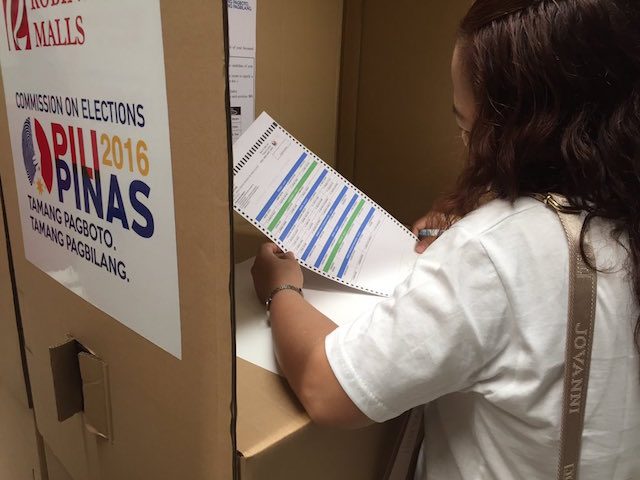SUMMARY
This is AI generated summarization, which may have errors. For context, always refer to the full article.

MANILA, Philippines (UPDATED) – The Commission on Elections (Comelec) held mock elections on Saturday, February 13, after fixing recent glitches in the voting system.
The voting process started at 7 am and was scheduled to end at noon.
The counting process would begin shortly after the voting.
Comelec Chairman Andres Bautista led the mock elections in H. Atienza Elementary School in Baseco, Manila.
He also moved to Robinsons Ermita mall to witness the voting process there.
The first voter in Baseco was 26-year-old Lawrence Panis.
Panis said this year’s voting process was relatively faster compared to the one in 2013, the last time the Philippines held automated elections.
He said it was easy, for one, to find his name on the voters’ list.
The Comelec chairman, however, noted that it took Panis around 11 minutes to cast his vote.
Bautista said the ideal time for voting is 2-3 minutes.

“Sa mga unang botante, parang matagal na,” he said. (It seems it took the first voters a long time.)
Bautista said the Comelec needs to improve its systems to speed up the voting process.
Saturday’s activity comes after the Comelec fixed glitches in the automated election system. Mock elections are expected to surface more potential issues and problems that should be addressed before election day itself.
At the Tenement Elementary School in Western Bicutan, for instance, early reports said voters were being turned down because of a wrong list. Some ballots were also rejected because of ink-blotting on the other side, but after reversing the orientation of the ballots, they were accepted by machines.
At the San Isidro Labrador precinct in the Ramon Magsaysay Elementary School, some ballots were also rejected because of overshading. The mock polls there had a very slow start with 10 voters initially.
System errors previously spotted also affected the vote-counting machines. The machines rejected 1-2% of ballot papers in a recent test.
Smartmatic said this is “no cause for alarm” because finding out errors is a normal part of tests.
Candidates like Vice President Jejomar Binay, however, criticized the Comelec for these glitches. Binay said “sinister parties” want to manipulate the elections. – with reports from Stephanie Ilacad and Samantha Santos/Rappler.com
Add a comment
How does this make you feel?
There are no comments yet. Add your comment to start the conversation.